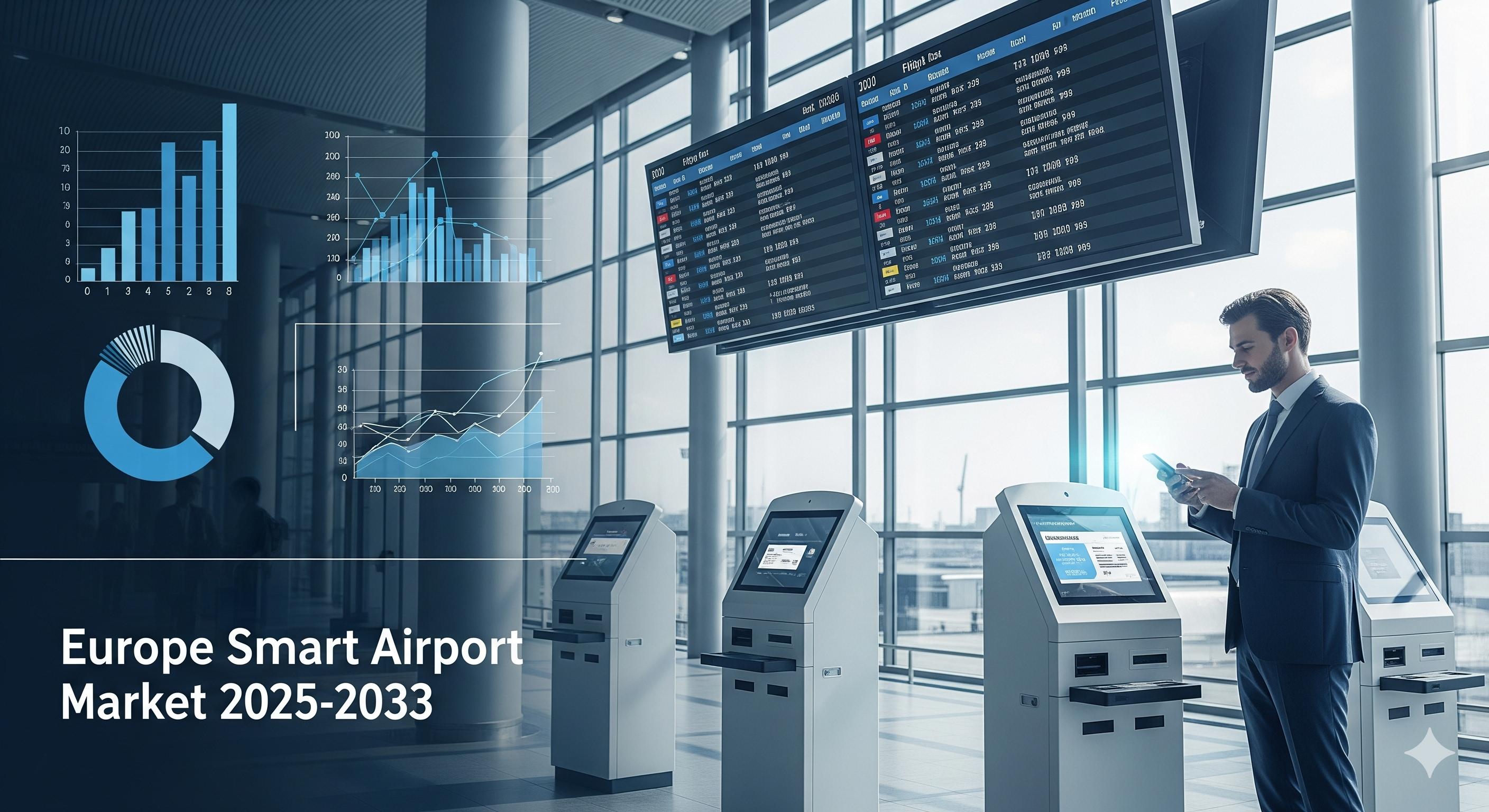Europe Smart Airport Market Forecast by 2033
Market Size in 2024: USD 9,363.8 Million
Market Forecast in 2033: USD 19,448.1 Million
Market Growth Rate 2025-2033: 8.46%
The Europe smart airport market is projected to expand from USD 9,363.8 million in 2024 to USD 19,448.1 million by 2033, registering a CAGR of 8.46%. Post-pandemic passenger rebound, EU-level green-digitisation mandates and rapid adoption of biometric self-service are converging to turn European airports into tech-driven mobility hubs.
Growth Drivers Powering the European Smart Airport Market
Passenger Rebound and Self-Service Demand
By the middle of 2025, air traffic within Europe was reported to have almost fully recovered to the levels before the pandemic (99% of 2019 levels). Consequently, hubs like Frankfurt and Madrid have been recording more than 6% monthly growth recently. IATA surveys depict that 73% of travelers would be ready to give biometric information if it resulted in shorter queuing times. Hence, carriers have started the implementation of biometric self-boarding gates, which handle 180 people per hour–twice the rate of manual gates. Each e-gate going-in installation generates new demand for middleware, RFID tags, and cybersecurity services thus guaranteeing the presence of multi-year upgrading projects for system integrators.
EU Green Deal and Energy-Efficient Retrofits
“Fit for 55”, the EU’s package, intends to cut air travel emissions by half, to achieve the goal of net-zero by 2030. As an example, the implementation of AI-driven smart occupancy detection in the HVAC system at Milan Malpensa via Siemens’ smart-building suite managed to save 28% of energy. According to Eurocontrol, sensor-based taxi-way routing can reduce aircraft fuel consumption by 5%, which results in a saving of 400,000 tons of CO₂ yearly for Europe as a whole. The deadlines for compliance are leading to the accelerated purchase of IoT-enabled building management and predictive-maintenance platforms. This market expansion far beyond passenger processing can thus envelop airside infrastructure.
Biometric Mandates and Seamless Travel Legislation
The implementation of the EU’s Entry/Exit System (EES) which obliges all border areas within the Schengen zone to capture facial and fingerprint biometrics, happened in October 2024. Thales equipped Paris-CDG and Orly with 1,200 biometric kiosks, whereas SITA’s Smart Path permits passengers to utilize one biometric token throughout check-in to boarding thus, total journey time is reduced by 30%. The wider the member states range implementing the biometric mandatory corridors, the more airports will have to invest in both the hardware and the middleware to receive smart-gate vendors and system integrators steady orders until 2033.
Request a Free Sample Copy of the Report: https://www.imarcgroup.com/Europe-Smart-Airport-Market/requestsample
Europe Smart Airport Market Segmentation
Analysis by Type
- Airport 2.0
- Airport 3.0
- Airport 4.0
Analysis by Size
- Large
- Medium
- Small
Analysis by System
- Wearables
- LPWAN and WLAN
- Tags and Sensors
- Platforms
- NFC, RFID and Bluetooth
- Wireless
- Others
Analysis by Operation
- Aeronautical
- Non-Aeronautical
Analysis by End Market
- Implementation
- Upgrade and Services
Analysis by Application
- Airside
- Air Traffic Maintenance
- Aircraft Maintenance
- Passenger Screening and Experience
- Digital Video Surveillance and Management
- Building Management
- Intelligent Advertising
- Others
Analysis by Country
- Germany
- United Kingdom
- France
- Italy
- Russia
- Spain
- Netherlands
- Switzerland
- Poland
- Others
Competitive Landscape
The competitive landscape of the industry has also been examined along with the profiles of the key players.
Europe Smart Airport Market News
- March 2025: Amadeus rolled out its cloud-based passenger-handling platform at Lyon-Saint-Exupéry, enabling biometric self-boarding and real-time baggage tracking.
- February 2025: Siemens secured a EUR 180 million contract to upgrade HVAC and baggage systems at Frankfurt Airport’s Terminal 3, targeting 28% energy savings.
- January 2025: SITA partnered with Swedavia to deploy 150 biometric kiosks across four Swedish airports, reducing passenger queuing time by 30%.
- December 2024: Thales completed the rollout of biometric corridors at Paris-CDG, processing 1,200 passengers per hour with facial-recognition match times under 5 seconds.
Key highlights of the Report:
- Market Performance (2019-2024)
- Market Outlook (2025-2033)
- COVID-19 Impact on the Market
- Porter’s Five Forces Analysis
- Strategic Recommendations
- Historical, Current and Future Market Trends
- Market Drivers and Success Factors
- SWOT Analysis
- Structure of the Market
- Value Chain Analysis
- Comprehensive Mapping of the Competitive Landscape
Note: If you need specific information that is not currently within the scope of the report, we can provide it to you as part of the customization.
About Us:
IMARC Group is a global management consulting firm that helps the world’s most ambitious changemakers to create a lasting impact. The company provide a comprehensive suite of market entry and expansion services. IMARC offerings include thorough market assessment, feasibility studies, company incorporation assistance, factory setup support, regulatory approvals and licensing navigation, branding, marketing and sales strategies, competitive landscape and benchmarking analyses, pricing and cost research, and procurement research.
